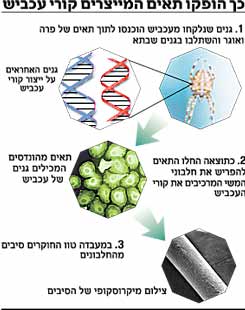Science / Researchers implanted spider genes in the cells of cows and hamsters
by Tamara Traubman

Scientists from a Canadian laboratory succeeded in transplanting genes taken from a spider into the cells of cows and hamsters, producing spider webs from these cells. The silk thread produced by the spider is one of the strongest and lightest materials in the world, and scientists are interested in using it for a variety of applications, including artificial tendons and creating bulletproof clothing.
The researchers, working at the biotechnology company "Nexia", injected the genes responsible for the production of spider silk webs into goats as well. Dr. Jeffrey Turner, CEO and president of the company, expects that in the spring they will start milking milk from the goats, which will contain proteins from which the spider's webs are made.
The study, which describes how the researchers inserted the genes into the cells, will be published today in the scientific journal "Science." The researchers were helped by scientists from the United States Army, and managed to collect the proteins that create the spider webs secreted by the cells of the genetically engineered cows and hamsters. Fibers are spun from the proteins, which are almost comparable in quality to the webs spun by the spider.
"When the silk threads produced by the spider are woven together, they are three times stronger than the fibers of bulletproof vests, and five times stronger than steel. "For years, the ability to mimic the properties of spider silk threads was considered the 'holy grail' of material science," said Turner.
The search for a method that would make it possible to produce spider webs in commercial quantities has occupied scientists in the field of material structure for decades. In the past, scientists tried to raise spider farms, but the attempt failed, because spiders are unsociable animals that guard their territory. In recent years, with the development of genetic engineering, various researchers inserted the genes responsible for the production of spider silk into bacteria, yeast cells and plants - but the results were disappointing. At best, the scientists obtained clumps of silk proteins, which remained inside the cells. Even after the proteins were extracted and refined, the fibers spun from them were fragile and worthless.
The basic premise of the Canadian research team, led by Dr. Anatoula Lazaris, was that better results would be obtained if they managed to insert the genes responsible for the production of the webs into cells similar to those from which the spider produces the silk threads. In spiders there are cells called epithelium, which line, among other things, glands in the spider's body, and are responsible for the production of two proteins. These proteins are secreted from the spider's silk glands outside its body, and make up - in a procedure that is still not completely clear - the silk web.
The researchers chose to insert the genes into two types of cells: cells from the mammary glands of cows, which excel in secreting proteins outside the cell; and cells taken from a hamster's kidney, adapted to produce large amounts of proteins. In both types of cells, silk proteins were formed, which were secreted outside of them, and could be easily collected. These proteins were soaked in chemical solutions, and then passed through tiny syringe holes, so that at the end of the process silk fibers were spun from them.
According to Turner, the resulting fibers were "light, strong like steel and flexible like nylon", but did not quite match the degree of flexibility and strength of natural spider webs. According to the researchers, this may be because the fibers are made of only one of the two proteins used by the spiders. According to them, soon they will try to weave fibers from both proteins together.
In the meantime, the scientists are trying to breed the genetically modified goats, in order to produce a herd of goats that can produce commercial quantities of silk proteins from milk.
https://www.hayadan.org.il/BuildaGate4/general2/data_card.php?Cat=~~~299381352~~~29&SiteName=hayadan
